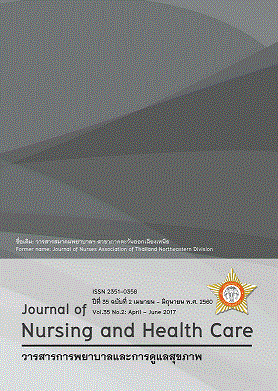อิทธิพลของทักษะชีวิตที่มีต่อภาวะสุขภาพจิตในวัยรุ่นตอนต้น Influencing of Life Skills on Mental Health in Early Adolescents
คำสำคัญ:
ภาวะสุขภาพจิตในวัยรุ่นตอนต้น, ทักษะชีวิต, ความภาคภูมิใจในตนเอง, การจัดการอารมณ์, ความเห็นใจผู้อื่น mental health in early adolescents, life skills, self-esteem, emotional coping, empathyบทคัดย่อ
บทคัดย่อ
วัยรุ่นอยู่ในวัยที่เสี่ยงกับการมีปัญหาทางด้านสุขภาพจิต แต่วัยรุ่นที่มีทักษะชีวิตเหมาะสมมักจะมีภาวะสุขภาพจิตดี การวิจัยแบบบรรยายเชิงทำนายครั้งนี้มีวัตถุประสงค์เพื่อศึกษาอิทธิพลของทักษะชีวิตที่มีต่อภาวะสุขภาพจิตในวัยรุ่นตอนต้น กลุ่มตัวอย่างคือ นักเรียนที่กำลังศึกษาระดับชั้นมัธยมศึกษาปีที่ 1-3 ในจังหวัดอุบลราชธานี จำนวนทั้งหมด 240 คน คัดเลือกโดยใช้วิธีการสุ่มแบบหลายขั้นตอน เก็บรวบรวมข้อมูลเดือนมิถุนายน พ.ศ. 2559 เครื่องมือที่ใช้ในการเก็บรวบรวมข้อมูล ได้แก่ แบบบันทึกข้อมูลทั่วไป แบบสอบถามภาวะสุขภาพจิตทั่วไปฉบับย่อ และ แบบสอบถามทักษะชีวิตพื้นฐานของวัยรุ่น มีค่าความเชื่อมั่นเท่ากับ .72 และ.86 ตามลำดับวิเคราะห์ข้อมูลด้วยสถิติพรรณนา และการวิเคราะห์ถดถอยพหุคูณแบบขั้นตอน
ผลการวิจัยพบว่า ทักษะชีวิตมีคะแนนเฉลี่ยเท่ากับ 146.17 (SD = 11.79) ภาวะสุขภาพจิตมีคะแนนเฉลี่ยเท่ากับ 1.10 (SD = 1.69) ความภาคภูมิใจในตนเอง เป็นตัวแปรทำนายที่ดีที่สุดของภาวะสุขภาพจิต (β = -.342, p < .05) การจัดการอารมณ์ เป็นตัวแปรทำนายลำดับที่สอง (β = -.250, p < .05) และความเห็นใจผู้อื่นเป็นตัวแปรทำนายลำดับที่สาม (β = .140, p < .05) ตัวแปรทั้งสามสามารถทำนายภาวะสุขภาพจิต ได้ร้อยละ 16.1 (R2 = .161, Adjust R2 = .150, F3,236 = 4.17, p < .01) ผลการวิจัยครั้งนี้ให้ข้อเสนอแนะว่า พยาบาลและผู้มีหน้าที่ให้การดูแลสุขภาพจิตวัยรุ่นควรจัดกิจกรรมส่งเสริมทักษะชีวิตวัยรุ่น โดยเฉพาะวัยรุ่นตอนต้น โดยมุ่งเน้นในเรื่องของความภาคภูมิใจในตนเอง การจัดการอารมณ์ และความเห็นใจผู้อื่น
Abstract
Adolescence is at risk of mental health problem. Adolescents with appropriate life skills will have healthy mental status. This descriptive predictive research aimed to examine influence of life skills on mental health status among early adolescents. A multi-stage random sampling was used to recruit a sample 240 students studying at Mutayomsuksa 1-3 in Ubonratchathani province. Data collection was carried out in June 2016. Research instruments consisted of a demographic questionnaire, the brief General Health questionnaire (GHQ-12), and the adolescent’s life skills (ALS) questionnaire. The GHQ-12 and ALS had Cronbach’s alpha coefficients of .72 and .86, respectively. Data were analyzed by using descriptive statistics and stepwise multiple regression analysis.
Results revealed that total mean score of life skills was 146.17 (SD = 11.79), and mean mental health status was 1.10 (SD = 1.69). Among all factors, self-esteem was the best predictor of mental health status (β = -.342, p <.05), the second best predictor was emotional coping (β =-.250, p <.05) and the third best predictor was empathy (β =.140, p <.05). These three predictors accounted for 16.1% (R2 = .161, Adjust R2 = .150, F3,236 = 4.17, p <.01) of the variance in explanation of the mental health status in early adolescents. The findings suggest that nurses and health care providers who are responsible for adolescent mental health should implement an activity to promote adolescent’s life skills, especially in early adolescents, by focusing on self-esteem, emotional coping, and empathy for others.



